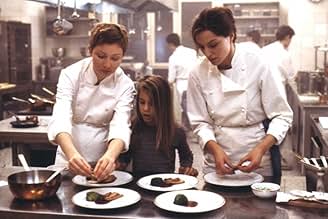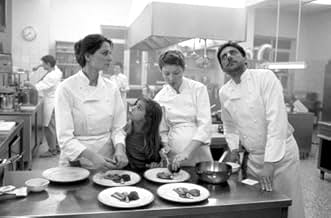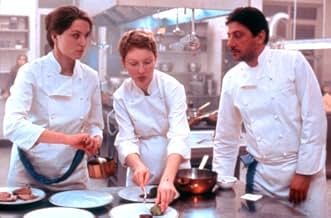CALIFICACIÓN DE IMDb
7.2/10
8.8 k
TU CALIFICACIÓN
Agrega una trama en tu idiomaWhen a headstrong chef takes charge of her equally stubborn 8-year-old niece, the tensions between them mount... until an Italian sous-chef arrives to lighten the mood.When a headstrong chef takes charge of her equally stubborn 8-year-old niece, the tensions between them mount... until an Italian sous-chef arrives to lighten the mood.When a headstrong chef takes charge of her equally stubborn 8-year-old niece, the tensions between them mount... until an Italian sous-chef arrives to lighten the mood.
- Dirección
- Guionista
- Elenco
- Premios
- 14 premios ganados y 7 nominaciones en total
Wolf-Dietrich Sprenger
- Lauter Gast
- (as W.D. Sprenger)
Victoria Trauttmansdorff
- Begleiterin
- (as Victoria von Trautmannsdorf)
Jerome Ducornau
- Jean
- (as Jerome Ducournau)
- Dirección
- Guionista
- Todo el elenco y el equipo
- Producción, taquilla y más en IMDbPro
Opiniones destacadas
This film is an excellent psychological study of a VERY controlled and emotionally constricted woman who uses food, believe it or not, as a way of avoiding intimacy. She is a superb chef who is incredibly precise and demanding concerning her cooking because she is so uncomfortable with people. However, into her tightly controlled world comes chaos in the form of her niece--whose mother was just killed in an auto accident. Not surprisingly, she has a hard time relating to this child and I was thrilled that her transformation to a whole person took time and wasn't achieved in a Hollywood-style way. Instead, this little girl (who was not overly cute or fake--thank goodness) and a new chef at her restaurant (who was completely unlike her) influence Martha in a way that is believable and satisfying.
By the way, while not quite as good as The Big Night (which came out the same year) or Babette's feast, this movie is VERY reminiscent of them--elevating food to a true work of art.
By the way, while not quite as good as The Big Night (which came out the same year) or Babette's feast, this movie is VERY reminiscent of them--elevating food to a true work of art.
(spoiler regarding the general plot)
Bella Martha reminds me of About A Boy, the "no man is an island" aspect of it. In some ways, Martha is like the guy played by Hugh Grant. The difference though is that while he apparently is really happy about the state of affairs, i.e. the isolation, she is not (even if she may not be fully aware of her own unhappiness). She has to visit a therapist regularly, although she claims that this is purely on instruction of her boss. I call this visit the first of the four "relationships" just to make the number sound more interesting.
The other three relationship all start to develop quite early in the film. First, a neighbour moves in, a gentlemanly engineer called Sam. Then in her "office" i.e. the kitchen of a restaurant where she is the chef, a chap called Mario is brought in by her boss as temporary relief for her assistant on maternity leave. Finally, death of her single-parent sister in an accident left her taking care of her eight-year-old niece Lina while they search her father in Italy.
The first half of the film developed these three relationships along the two fronts: home and office. Soon, it is clear that Sam's role is not really significant, serving just as a dependable friend and emergency-baby-sitter. On the other hand, rocky starts of the other two relationships smooth out as the two fronts merge. Lina comes to the restaurant kitchen in the evenings, becoming a darling there, while Mario becomes a family friend and Lina's buddy, and the three look just like a family. We begin to see smiles on Martha's face.
As in similar movies, just after the mid-point, when characters are well developed and things go nicely, conflicts occur. What I found is that the hostility of Lina towards Martha is less than convincing, even if we take into account her possible rejection of Martha as a mother-substitution. The eventual reconciliation also comes a little too easily. The other conflicts, on which I won't go into details, are not that well developed.
But that is exactly the main point. This is not a Hollywood movie with the standard formula of powerful dramatic conflicts and climatic tear-jerking conclusions. This point is well made when we see the ending of the story given to us quite casually as part of the credit roll. Oh yes, there's a concluding scene with the therapist, reminding us of the sense of humour that comes as part of the film.
Smooth jazz (not sure if that's the right terminology) has been used throughout the film, at the right times, enhancing it rather than distracting from it.
Finally, I really love the scenes in the kitchen which is Martha's entire universe at the beginning of the film, as well as where her reconciliation with both Mario and Lina first takes place. The story aside, I really enjoy the operation in the kitchen, which is the exact opposite to the mass production lines brought about by the industrial revolution. Here, in Martha's kitchen, things are done with what I can only describe as artistic flair.
Bella Martha reminds me of About A Boy, the "no man is an island" aspect of it. In some ways, Martha is like the guy played by Hugh Grant. The difference though is that while he apparently is really happy about the state of affairs, i.e. the isolation, she is not (even if she may not be fully aware of her own unhappiness). She has to visit a therapist regularly, although she claims that this is purely on instruction of her boss. I call this visit the first of the four "relationships" just to make the number sound more interesting.
The other three relationship all start to develop quite early in the film. First, a neighbour moves in, a gentlemanly engineer called Sam. Then in her "office" i.e. the kitchen of a restaurant where she is the chef, a chap called Mario is brought in by her boss as temporary relief for her assistant on maternity leave. Finally, death of her single-parent sister in an accident left her taking care of her eight-year-old niece Lina while they search her father in Italy.
The first half of the film developed these three relationships along the two fronts: home and office. Soon, it is clear that Sam's role is not really significant, serving just as a dependable friend and emergency-baby-sitter. On the other hand, rocky starts of the other two relationships smooth out as the two fronts merge. Lina comes to the restaurant kitchen in the evenings, becoming a darling there, while Mario becomes a family friend and Lina's buddy, and the three look just like a family. We begin to see smiles on Martha's face.
As in similar movies, just after the mid-point, when characters are well developed and things go nicely, conflicts occur. What I found is that the hostility of Lina towards Martha is less than convincing, even if we take into account her possible rejection of Martha as a mother-substitution. The eventual reconciliation also comes a little too easily. The other conflicts, on which I won't go into details, are not that well developed.
But that is exactly the main point. This is not a Hollywood movie with the standard formula of powerful dramatic conflicts and climatic tear-jerking conclusions. This point is well made when we see the ending of the story given to us quite casually as part of the credit roll. Oh yes, there's a concluding scene with the therapist, reminding us of the sense of humour that comes as part of the film.
Smooth jazz (not sure if that's the right terminology) has been used throughout the film, at the right times, enhancing it rather than distracting from it.
Finally, I really love the scenes in the kitchen which is Martha's entire universe at the beginning of the film, as well as where her reconciliation with both Mario and Lina first takes place. The story aside, I really enjoy the operation in the kitchen, which is the exact opposite to the mass production lines brought about by the industrial revolution. Here, in Martha's kitchen, things are done with what I can only describe as artistic flair.
The charms outweigh the clichés in "Mostly Martha (Bella Martha)." Of course it's right away different in that the phrase "German romantic comedy" isn't common and can be applied here.
I loved that "Martha" herself is a competent, self-possessed professional and that's what attracts the guy to her. While we first meet her in therapy, her problems are those of work and personal life I could certainly relate to.
While this will remind others of food prep movies like "Wedding Banquet," "Eat, Drink, Man, Woman," and "Tortilla Soup" or restaurant movies like "Dinner Rush" and "Big Night," (which all had male chefs), or "Babette's Feast," I have zero interest in cooking so cared only that "Martha" is very good at her job and at managing the restaurant kitchen.
The restaurant characters seem like real co-workers, and amazingly the niece is not some adorable child actor but seems like a real kid whose surliness is legit.
The Italian sous chef who comes on board brings the sensuality of the Mediterranean --in music (with a generous use of Paolo Conte songs), movement and language much like in the Danish "Italian for Beginners."
And of course in romance, which is still delightful even as the clichés start appearing, her happiness is indicated by her loosened hair like Jane Fonda's in "Electric Horseman."
But I enjoyed the build-up to their relationship in ever longer, longing glances and their mutual professional respect and concluding compromises.
(originally written 9/2/2002)
I loved that "Martha" herself is a competent, self-possessed professional and that's what attracts the guy to her. While we first meet her in therapy, her problems are those of work and personal life I could certainly relate to.
While this will remind others of food prep movies like "Wedding Banquet," "Eat, Drink, Man, Woman," and "Tortilla Soup" or restaurant movies like "Dinner Rush" and "Big Night," (which all had male chefs), or "Babette's Feast," I have zero interest in cooking so cared only that "Martha" is very good at her job and at managing the restaurant kitchen.
The restaurant characters seem like real co-workers, and amazingly the niece is not some adorable child actor but seems like a real kid whose surliness is legit.
The Italian sous chef who comes on board brings the sensuality of the Mediterranean --in music (with a generous use of Paolo Conte songs), movement and language much like in the Danish "Italian for Beginners."
And of course in romance, which is still delightful even as the clichés start appearing, her happiness is indicated by her loosened hair like Jane Fonda's in "Electric Horseman."
But I enjoyed the build-up to their relationship in ever longer, longing glances and their mutual professional respect and concluding compromises.
(originally written 9/2/2002)
It's almost as if Nettelbeck had been given a recipe for a perfect film - start with the tried-and-tested, take a character living alone, set in his/her ways then saddle him/her with a young kid and simmer the love-hate on a low flame; add a culture clash and vamp til ready -and discarded it in favor of her own ingredients. The culinery metaphor is self-explanatory but it IS fun to see the heavy, lard-based German cuisine slugging it out with the lighter, oil-based Italian style. Up front we have two cold teutonic hearts, aunt and neice and with the introduction of the Italian extrovert chef we know it is only a matter of time til the warm Italian sun thaws the cold aryan hearts. That's pretty much what happens but it is a DELIGHT to go along for the ride and surrender your emotional taste-buds to Nettelbeck's expertise for the entire running time. I've just seen this movie for the second time in about 8 months and I was just as captivated this time around. 9/10
This German film is one of the happiest surprises of the year. Not only is it a well paced, acted, and directed, but it involves the viewer like no other film in recent memory. Director/writer Sandra Nettelbeck deserves praise for bringing this joyous piece to the screen.
Martina Gedleck, as Martha, is perfect as the control freak of the upscale restaurant. Obviously, she can cook, judging by the full houses and the good vibes she generates among the diners. What she has in smarts, she lacks in social graces. Obviously, she doesn't have a life.
Her world is shattered by the arrival of a niece that comes to her under tragic circumstances, and from Mario, the new Italian cook. One can see the new man in her kitchen is too much of a free spirit, who ultimately will be her downfall.
Mario, very nicely played by Sergio Castelletto, is the opposite of his German colleague. It doesn't take long for him to charm the daylights out of Martha. Sparks fly whenever they are on screen together. Both principals have the right chemistry and that's why this film works so well. It will surely disarm anyone in the right state of mind. The only thing is that one must leave the theatre craving for a great meal.
Martina Gedleck, as Martha, is perfect as the control freak of the upscale restaurant. Obviously, she can cook, judging by the full houses and the good vibes she generates among the diners. What she has in smarts, she lacks in social graces. Obviously, she doesn't have a life.
Her world is shattered by the arrival of a niece that comes to her under tragic circumstances, and from Mario, the new Italian cook. One can see the new man in her kitchen is too much of a free spirit, who ultimately will be her downfall.
Mario, very nicely played by Sergio Castelletto, is the opposite of his German colleague. It doesn't take long for him to charm the daylights out of Martha. Sparks fly whenever they are on screen together. Both principals have the right chemistry and that's why this film works so well. It will surely disarm anyone in the right state of mind. The only thing is that one must leave the theatre craving for a great meal.
¿Sabías que…?
- TriviaSergio Castellitto's German wasn't good enough so Frank Glaubrecht was brought in to dub his voice for the German version.
- ErroresWhen Mario and Lina get ready to cook dinner at Martha's apartment, Lina puts on her apron twice.
- ConexionesFeatured in Le cinéma passe à table (2005)
- Bandas sonorasCountry
Written by Keith Jarrett
Performed by Keith Jarrett, Jan Garbarek, Palle Danielsson, Jørn Christensen
ECM Records
Selecciones populares
Inicia sesión para calificar y agrega a la lista de videos para obtener recomendaciones personalizadas
- How long is Mostly Martha?Con tecnología de Alexa
Detalles
Taquilla
- Total en EE. UU. y Canadá
- USD 4,160,475
- Fin de semana de estreno en EE. UU. y Canadá
- USD 40,446
- 18 ago 2002
- Total a nivel mundial
- USD 9,852,022
- Tiempo de ejecución
- 1h 49min(109 min)
- Color
- Mezcla de sonido
- Relación de aspecto
- 1.85 : 1
Contribuir a esta página
Sugiere una edición o agrega el contenido que falta

![Ver Trailer [OV]](https://m.media-amazon.com/images/M/MV5BYmI4MTFiNjAtNzg5ZC00Mjg2LWFhNDYtMTVhYjYyMTM3ZGM5XkEyXkFqcGdeQXRyYW5zY29kZS13b3JrZmxvdw@@._V1_QL75_UX500_CR0)



























